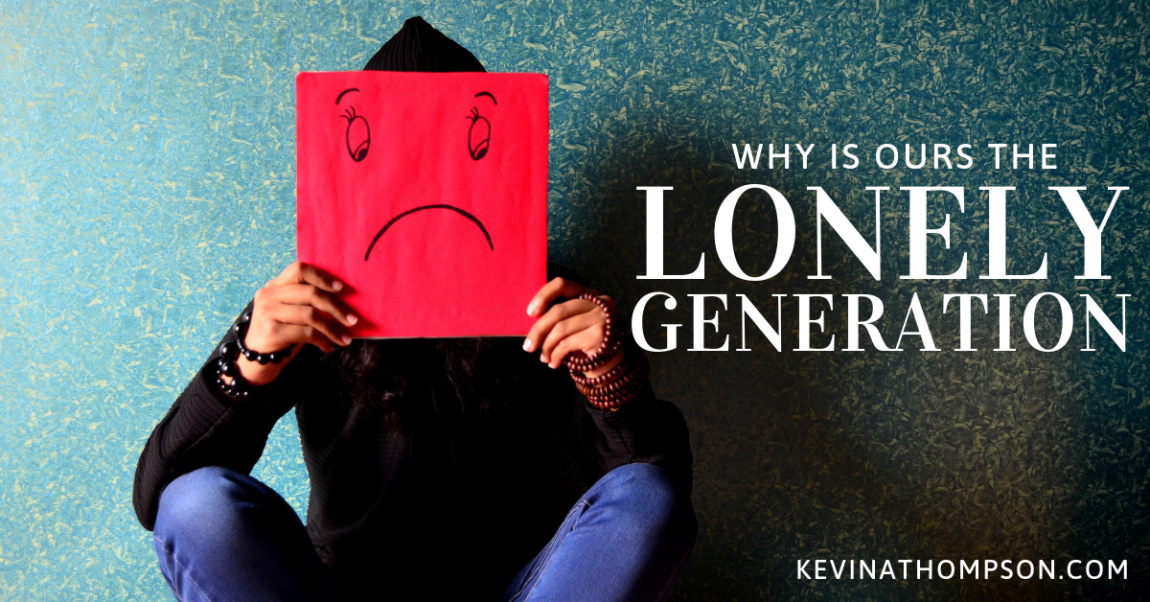We live in the most materialistic society to ever exist.
Ours may be the loneliest generation to ever live.
These are not unrelated circumstances. We are the lonely generation because, in the moments where our forefathers turned to others, we turn to things.
Two years ago the Boston Globe ran an article about the great health threat to aging men. It wasn’t about heart disease, stroke, or cancer. It was about loneliness. The negative impact loneliness has on our health equals that of long-term smoking. (See the article, Here)
Four years ago, Harvard released the results of a 75-year study on life satisfaction. It found that the number one indicator of life satisfaction is not money, power, or career. It is meaningful relationships.
Nearly 3,000 years ago, the book of Genesis records God saying, “It’s not good for man to be alone.”
We were created for community. We need it in the same way we need air, water and food. Without meaningful connections to others, we suffer greatly. But there is a problem. Relationships are scary. They require vulnerability, transparency and truth. We risk rejection, manipulation and pain. We need others, but relating to others is risky.
But we can’t be alone. Loneliness will kill us. So we turn to material things as a replacement for relationships. A phone will never require vulnerability. A larger house never rejects us. A new car won’t ghost us. Yet people may. So we turn to things rather than people.
Phones Over People
On Friday I visited a friend at the hospital. It was late. The hallways were quiet. Just as the doors began to shut, someone joined me in the elevator. We spoke and then subconsciously I reached into my pocket and pulled out my phone. I didn’t think about it. There wasn’t a reason for it–information didn’t need to be retrieved. It couldn’t even be retrieved because my signal doesn’t work in an elevator. The action was mere protection. I would have happily spoken to the other person, listened to their story, or helped them in any way possible. But for that interaction to happen, they would have to break through my layer of protection–the use of my phone.
I think my phone-affair is a consequence of modern society. In reality, it’s a reaction made out of fear. Relationships are risky. To open ourselves up to others is to risk the possibility of rejection or pain. So we turn to things rather than each other. We think this will keep us safe. Instead, it destroys us.
Materialism and Community
There is a basic correlation between materialism and community. As one increases, the other decreases. We are the lonely generation because we are a materialistic generation. As we continually turn to material things, we are failing to turn to meaningful relationships. The result is that we are surrounded by people, but known by no one. We have thousands of Facebook friends, but very few real-life friends. We have more things than any society to have ever existed, but many of us are isolated, lonely, and sad.
We don’t know what is wrong with us. What’s wrong is that we are living contrary to our design. It’s never been good for us to be alone. We must live in meaningful relationships with others or we will pay a significant physical, emotional, and spiritual price. (See: Two Complications of Real Relationships)
Chances are, you already are.
So What?
I don’t know anyone who wants to be materialistic. No one grows up thinking they want to value material things over people. But most of us do. So what do we do?
First, we must recognize God’s design for our lives. We need others. That’s true of everyone. You are not the exception. If you think you can flourish in isolation, you are wrong. Admit your need.
Second, we must value relationships. After we understand our need, we must value relationships the same way we value a job, a house, and other materialistic things. Most of us can’t go two weeks without a paycheck. None of us can be healthy and go for two weeks without true connections. Prioritize them.
Third, we must get to work. It’s not easy. It won’t be without cost. But we must begin to take specific steps toward others. Call a friend for lunch. Invite someone to a game. Check in with those you love. Reach out to someone you don’t know. The temptation will be to do something more pressing. Ignore the temptation and do what is necessary.
Four, we must begin to notice when we turn to things over people. We all do it and we probably do it far more than we realize. Recognize the elevator moments. Identify the habits that have been formed which are robbing us of interactions with others because we are hiding behind material things. As we identify bad habits, we can begin to make better choices.
Fear or Love
It seems too simplistic, but it’s not. Fear drives us toward materialism, love drives us toward people. Choose love. Feel the fear, but don’t be defined by it. The way of love is always better. Make the call. Write the letter. Stop turning toward things and start turning toward people.
Because we are the most materialistic society to ever exist, we are the loneliest generation the world has ever known. Thankfully, there is another way. (How connected are you? Take this simple test.)




One Response to Why Is Ours the Lonely Generation?